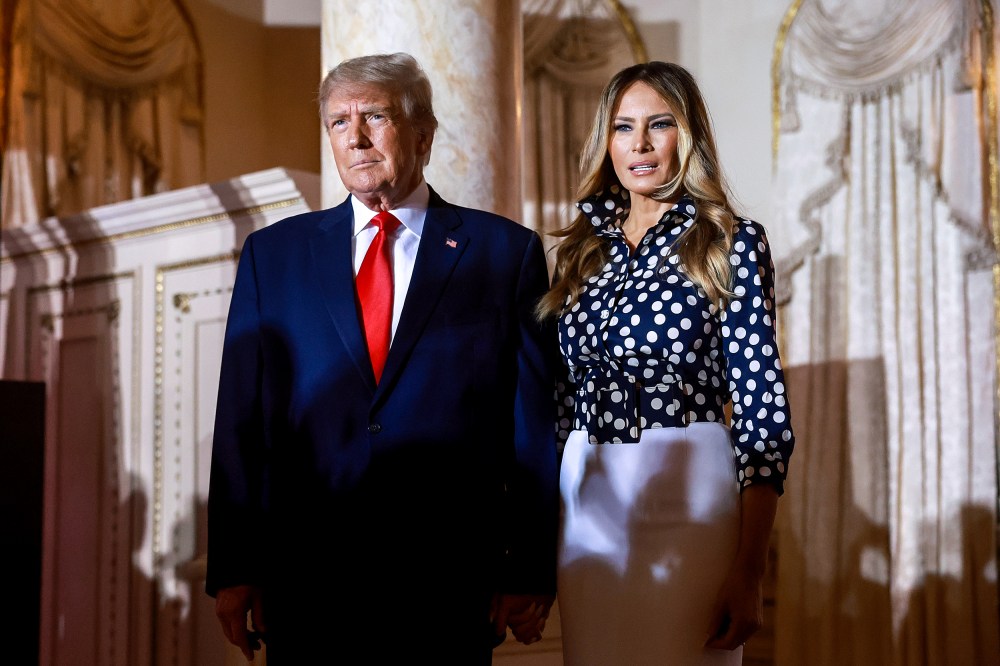Melania Trump was not present when her husband, former President Donald Trump, was arraigned on 34 criminal charges in New York City last week. She was not present later that day at Mar-a-Lago when in a speech he attacked the district attorney who convened the grand jury that brought those charges.
For more than century, would-be first ladies have happily (or perhaps unhappily) stumped by their men en route to the White House.
According to People magazine, Melania Trump may have decided to give her husband’s entire 2024 presidential campaign a miss. A source told writer Linda Marx that Melania Trump “hasn’t recently taken part in her husband’s political events. It is not comfortable for her.” Perhaps this will not come as a shock, considering how absent Melania Trump was during her husband’s 2016 and 2020 campaigns, but it is nonetheless a striking development.
For more than a century, would-be first ladies have happily (or perhaps unhappily) stumped by their men en route to the White House. Florence Harding, for example, was hugely involved in the 1920 Front Porch campaign of her beloved Warren, and despite a recurring kidney ailment, she embraced with aplomb the couple’s folksy receptions day after day, hosting tens of thousands of visitors. This porch-style campaign was actually pioneered by another Ohio couple, the McKinleys, in 1896, but Ida McKinley’s own devastating illness kept her mostly behind the scenes. Even so, supporters circulated a biography of Ida — such was her importance to her husband’s success.
Eleanor Roosevelt called for Franklin D. Roosevelt’s unprecedented third nomination during the 1940 Democratic Convention, at the beginning of World War II. Pat Nixon called for her husband’s nomination at the Republican Convention in 1972 in the midst of another war, though the thundering claps of boorish delegates largely silenced her. A standout example of first lady campaigning, of course, was the 1964 solo whistle-stop tour of Lady Bird Johnson, deep into the dangerous and distrustful South. Such campaigning helped Lyndon B. Johnson win the presidency in the wake of the Civil Rights Act. Lady Bird had earlier stepped in for a pregnant Jacqueline Kennedy in 1960, but Jackie herself was not absent. Among other contributions, she made Spanish-language commercials for her husband.
First ladies including Hillary Clinton, Laura Bush and Michelle Obama have taken to the hustings even during the midterms. But there, too, Melania Trump was missing. She avoided all but the most minimal role in 2018, even as former first lady Obama was out working for Democrats. And of course, Jill Biden has been active in many of her husband’s campaigns and other Democrats’ campaigns. Like other first ladies in recent decades, she has been an asset for her sometimes unpopular husband, even as she promotes his accomplishments.
One imagines Melania Trump could have done the same in 2016 and 2020 by humanizing her husband or touting his proposals. Instead, one of her rare appearances in 2020 came just days before the election, and that was after a long absence. It wouldn’t be surprising, then, if this time she completely bows out.
Elizabeth Natalle, Diana Carlin and Molly Wertheimer — three communications scholars from the First Ladies Association for Research and Education (FLARE) that I consulted for this piece — noted Melania Trump’s longtime reticence as a public speaker. Despite being fluent in several languages, she tends to avoid speaking on the stump. As Natalle suggests, this is tied as well to a key element of their conjugal relationship: In the Trumps’ “independent marriage structure, Melania makes her own decisions.” Not growing up in the United States, Melania also came into office less familiar with the expectations many hold for the office of first lady, Carlin notes; campaigning is not something she enjoys.
News organizations have made assumptions about the former First Lady's stance on subjects that are personal, professional, and political over the past few weeks. In these articles, unnamed sources are cited to bolster the author's claims.












